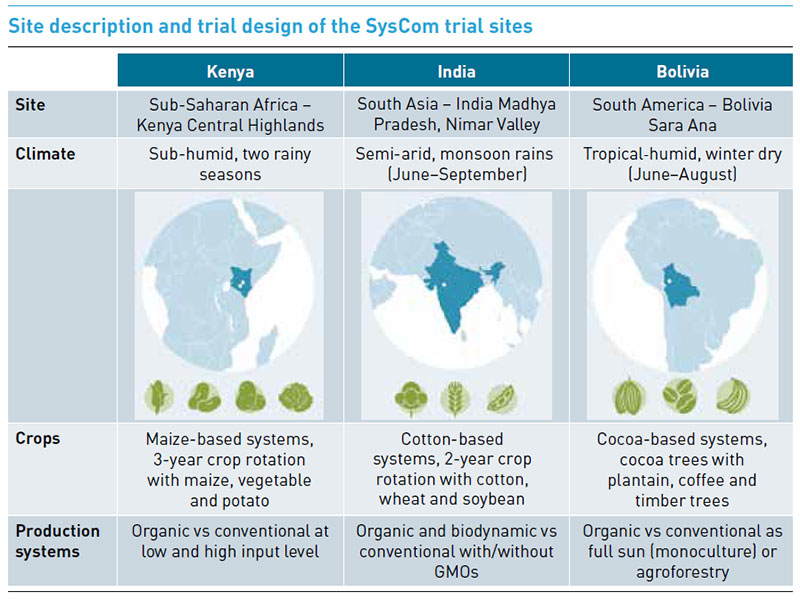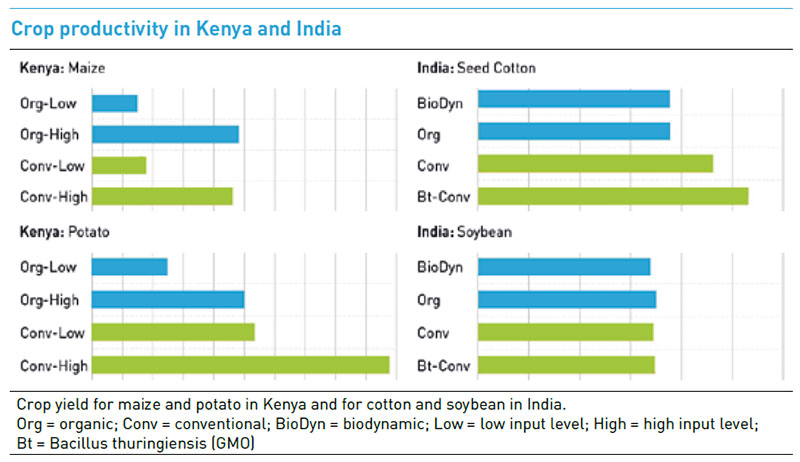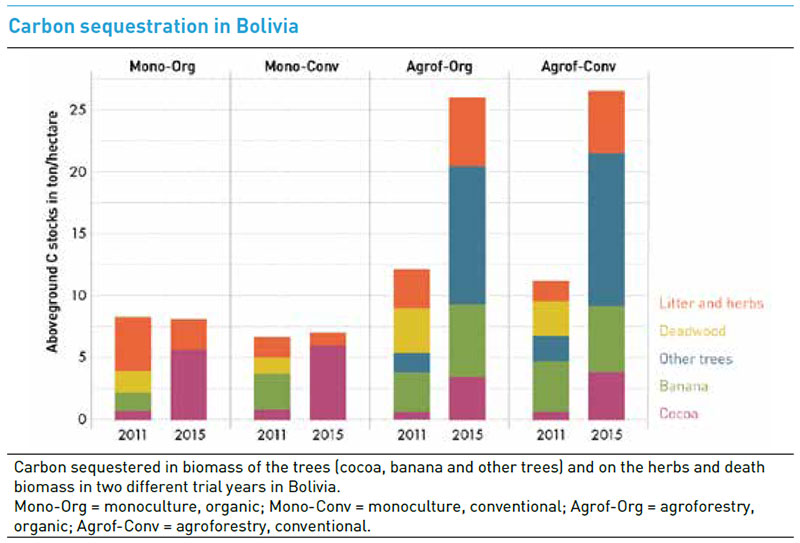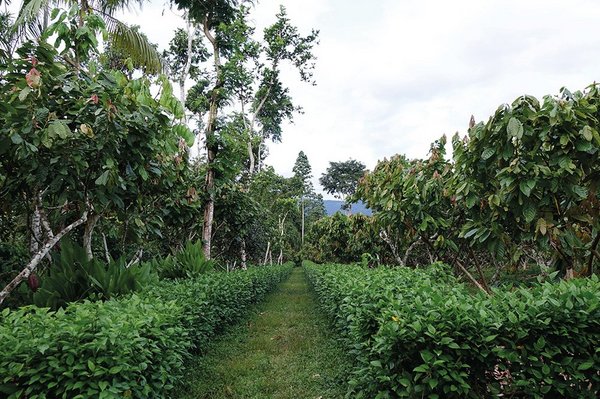 Download this article in magazine layout
Download this article in magazine layout
- Share this article
- Subscribe to our newsletter
Organic agriculture – a viable solution to achieving the SDGs
Climate change, biodiversity loss, and depletion of natural resources are urging society to change the prevalent way of farming. Several alternative production systems, such as organic farming, promise environmental and social benefits. Organic farming refrains from using synthetic pesticides and fertilisers, relying on crop rotation and intercropping, and emphasising closed nutrient cycles. Therefore, organic systems prioritise locally adapted crop varieties and locally available resources. Organic agriculture aims to sustain and enhance the health of the environment and humans. Nonetheless, it has been questioned whether organic agriculture can contribute to sustainable development. Several studies conducted in temperate environments (mostly in Europe or Northern America) have established the benefits of organic farming over conventional farming. However, the results cannot be directly extrapolated to tropical conditions, and here, only little scientific evidence is available regarding organic systems' performance in a different climate, crop and socioeconomic context. Recognising this gap, the Swiss Development Cooperation (SDC), together with the Swiss-based COOP Sustainability Fund, the foundation Biovision and the Lichtenstein Development Service (LED), supported the programme “Long-term farming systems comparisons trials in the tropics” (SysCom; see Box at the end of the article).
With this support, SDC was seeking evidence for the assumption that organic farming could be a viable option in the tropics and increase the resilience of ecosystems and smallholder livelihoods by promoting low-external input-based production strategies. Scientific evidence allows putting the debate on transformation pathways towards sustainable food systems on a more rational basis. The programme could become a reference for this debate, influencing policy decisions towards more agroecological and sustainable approaches, also with regard to various Sustainable Development Goals (SDGs).
The SysCom programme has been running for over a decade in diverse agroecological environments. Four long-term experiments were established in Kenya, India, and Bolivia between 2007 and 2008 to evaluate organic and conventional production systems' performance (see Figure). Additionally, participatory on-farm research was performed which aims to develop technological innovations and management practices, ensuring that organic farmers' needs are addressed directly. Together, the long-term trials and participatory research offer a unique platform to address critical questions on the viability of various production systems and their contribution to sustainable agricultural development at the local, national and international levels. The following conclusions are drawn to illustrate how organic farming can contribute to achieving several of the SDGs and what action is needed to develop organic farming in the tropics.

Yield and profit of farming systems
To contribute to the SDGs “Zero Hunger”(Goal 2) and “No Poverty” (Goal 1), agricultural production systems need to be productive and profitable. Therefore, we compare the yields and the profit gained in organic production systems to what conventional systems achieve.
The yields of organic production systems can equal those of conventional systems, although this depends on the crop type and the management practices (see upper Figure on page 40). For instance, legumes (e.g., soybeans or common beans) achieve similar yields in organic and conventional systems. They do not rely on the external nitrogen inputs since they can fixate nitrogen from the atmosphere. On the other hand, yields can be lower in cereals (e.g. wheat or maize) or cotton. These crops do depend strongly on fertilisation in their crucial growth stages, and even though organic inputs can build up soil fertility in the long run, they are often less easily accessible for plants than synthetic fertilisers. In organic vegetable production, yields were lower than in conventional systems due to the challenge of successfully managing pests and diseases. This is especially true when the organic systems try to mimic conventional methods and only substitute conventional pesticides with bio-pesticides/ botanicals.

We also learnt that the complexity of the production systems could significantly affect yields, i.e. a well-thought-through crop rotation, intercropping, or border-cropping of plants attracting beneficial insects and repelling pests not only increases the biodiversity but also helps to manage pest and diseases better. Such management practices had a greater impact than the effect of conventional or organic production. For instance, in cacao production, we found strong differences between monoculture (i.e., cocoa trees growing alone) and agroforestry systems (i.e. cocoa trees growing together with other companion trees), although whether monocultures or agroforestry systems were managed organically or conventionally had much less impact. While in complex systems such as agroforestry the yields of cocoa for instance are lower, we achieve higher total productivity and a higher diversity of products when we consider the whole yields from the field, e.g. including plantain, banana, other fruits, cereals or tuber crops.
The profitability of a production system is, simply speaking, the result of the yields achieved and the prices for marketable products minus the production costs. Costs for organic fertiliser or (bio-) pesticides are often lower in organic systems. Additionally, organic produce can fetch higher market prices, compensating for the economic loss due to lower yields in certain crops. However, labour demands, e.g. for compost preparation, contribute strongly to production costs in organic systems. Partially, organic systems can achieve higher returns on production costs and equal returns on labour, making them a suitable option, particularly for capital-poor smallholder farmers.
Sustainability beyond yield
To assess the sustainability of a production system, one needs to look beyond yield and profit. When it comes to SDGs such as "Life on Land" (Goal 15) or "Climate Action" (Goal 13), we found that organic agriculture has several comparative advantages compared to conventional agriculture. For example, residues of synthetic pesticides could even be detected in the crops and environment of the well-managed conventional production plots, whereas this was not the case in the organic plots, where only organic pest control products were applied. Another benefit of organic agriculture is its comparatively higher biodiversity: bird species diversity and earthworm abundance were higher in organic production systems. We found evidence that the build-up of soil fertility (e.g. higher carbon content in the soil and aboveground biomass – see Figure below) over the long term is enhanced in organic systems. Carbon plays an important role in mitigating climate change and increases resilience.

Fostering organic farming in the tropcis – policy recommendations
Based on the SysCom programme's evidence, organic farming can be seen as a viable solution to achieve several SDGs by 2030. The following recommendations are relevant to agricultural policies at the national and regional level, actors in specific commodities, sectors and value chains to develop organic farming in the tropics.
System-oriented pricing: For many organic farmers, premium prices are only available for certain cash crops destined for export markets (such as cocoa and cotton), and not for other crops in the rotation. A conducive policy environment providing production system-oriented pricing and compensation schemes will support profitable organic production systems that enhance livelihoods.
Market linkages for diversified production: Organic farming and agroforestry systems offer a wider range of products than conventional farming based on monocultures. Therefore, organic farmers need to sell the different products they produce as 'organic'. Reducing farmers' dependency on particular (mostly export-oriented cash) crops will improve their livelihoods and support diversified farming systems. This requires a stimulating business environment that fosters market innovations and primes local markets for a diversified range of organic produce.
Capacity building and extension services: Farm performance varies widely across different agricultural management practices and production systems, suggesting a lack of best practice implementation. Capacity building on good management practices improves yields and reduces losses due to pests and diseases. Policies should recognise the importance of know-how to manage sustainable farms successfully and prioritise capacity building for farmers. Organising farmers into cooperatives and (self-help) groups can build capacities, e.g. through peer-to-peer learning and development and dissemination of innovative solutions.
Technical innovations and medium-scale mechanisation: Challenging labour requirements and declining labour availability force smallholders to either scale down their activities or opt for simpler farming systems, threatening food security and livelihoods. Technical innovations and medium-scale mechanisation adapted to the local conditions reduce the need for manual labour and are thus key to empowering small-scale organic farmers. Such innovations can help farmers sustain and increase their activities, lower their production costs and improve their livelihoods and food security.
The DOK trial in Switzerland
The SysCom programme was inspired by the famous DOK Trial (“Dynamisch-Organisch-Konventionell” – dynamic-organic-conventional), an experiment comparing farming systems running in Switzerland since 1978 and managed by the Forschungsinstitut für Biologischen Landbau (FiBL) in collaboration with Agroscope, the Swiss centre of excellence for agricultural research. The trial provided scientific evidence that organic arable farming can achieve good, highquality yields and contributed significantly to the general acceptance of organic farming both at policy level in Switzerland and at international scientific level.
Closing the research gap: Over the last decades, research focused on the intensification of conventional production systems. Holistic systems design, building on diversified and interlinked production patterns, was neglected. Research on optimising nutrient management, carbon storage, and tillage practices and implementing a systems approach for pest and disease management is needed to address critical organic agriculture challenges in the tropics. Research and technology development must acknowledge that resilience increases with the complexity of a system and strengthens farming to face the threats imposed by climate change.
Provision of public goods: Organic farming sustains public goods by providing ecosystem services such as supporting carbon sequestration, conserving biodiversity and improving nutrient cycling. Awareness among consumers and decision-makers for these benefits of organic farming enables an environment in which organic farming can grow and contribute to truly sustainable food systems, providing healthy food for a growing population without damaging human and environmental health.
The authors are members of the SysCom team, led by Beate Huber, at the Forschungsinstitut für Biologischen Landbau (FiBL) in Frick, Switzerland.
David Bautze works mostly in SysCom Kenya, and Eva Goldmann with SysCom India, while Laura Armengot is Scientific Coordinator of the programme and works with SysCom Bolivia.
Contact: beate.huber@fibl.org
The SysCom programme is implemented in close collaboration with partners from research, farmer organisations and NGO’s. Key partners for managing the trials are icipe, KALRO, KOAN, Kenyatta University and KIOF in Kenya, Ecotop, Instituto de Ecologia and El Ceibo in Bolivia as well as bioRe in India.
Further reading:
Comprehensive information on the research findings have just been published in the report “What is the contribution of organic agriculture to sustainable development? A synthesis of twelve years (2007-2019) of the long-term farming systems comparisons in the tropics (SysCom)”. The report is available here: https://systems-comparison.fibl.org
The “Money Flows Report” published by Biovision, IPES-Food and the Institute of Development Studies (IDS) in 2020 investigated the financial flows in food system research to sub-Saharan Africa. It highlights the insufficient funding for agroecology in Africa and the great disparity between donors in this regard. One positive example was Switzerland, with over 50 % of Swiss-funded research projects supporting agroecology.
Link: https://www.agroecology-pool.org/moneyflowsreport/





Add a comment
Be the First to Comment